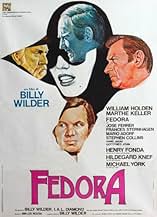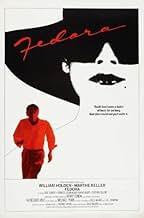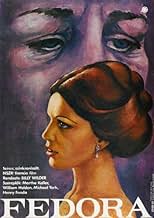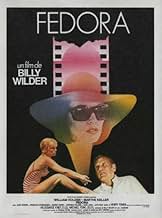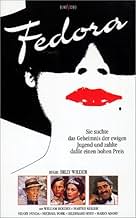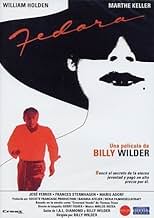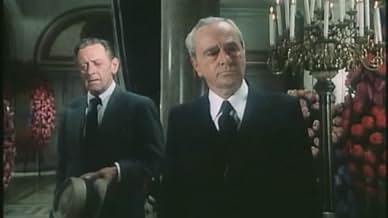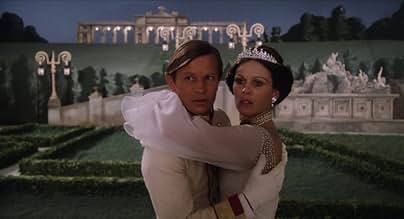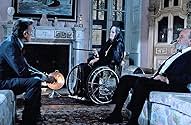CALIFICACIÓN DE IMDb
6.8/10
5.6 k
TU CALIFICACIÓN
El pobre productor de Hollywood Barry 'Dutch' Detweiler intenta sacar a Fedora, una famosa pero solitaria actriz de cine, de su retiro.El pobre productor de Hollywood Barry 'Dutch' Detweiler intenta sacar a Fedora, una famosa pero solitaria actriz de cine, de su retiro.El pobre productor de Hollywood Barry 'Dutch' Detweiler intenta sacar a Fedora, una famosa pero solitaria actriz de cine, de su retiro.
- Dirección
- Guionistas
- Elenco
- Premios
- 1 premio ganado y 1 nominación en total
Robert Cunningham
- Assistant Director
- (as Bob Cunningham)
- Dirección
- Guionistas
- Todo el elenco y el equipo
- Producción, taquilla y más en IMDbPro
Opiniones destacadas
Billy Wilder's second-last film comes full circle from 1950's Sunset Boulevard.
Fedora begins with a news announcement of the great actress' death. Dutch Detweiler (William Holden) narrates the film, and attends Fedora's lying in state. He recalls what led up to that moment, and the story begins.
Dutch (William Holden) has a script that is perfect for the actress Fedora (Marthe Keller), a Garbo-like myth wrapped in a legend, who lives a reclusive life in Corfu.
One day, he sees her in town and reintroduces himself - they knew each other 30 years earlier. He is astounded by her unchanged beauty. She wears gloves because her doctor can't do anything about aging hands. and she asks him for a few dollars. When he asks if she received his script, she says that they hide the mail from her.
After some spying on Fedora, Dutch comes to the conclusion that she is not being well treated and is imprisoned. Desperate to see her, he tries every way he can to gain entrance to the house, and at one point actually breaks in, only to be knocked out by someone who acts as her chauffeur. When he comes to, he's in his hotel, and a week has passed. And lots has happened.
Fedora is based on the story in Tom Tryon's book, "Crowned Heads," which is three stories - the first about a Lana Turner-type, the second a combination of Clifton Webb and Ramon Navarro, and the third Fedora, actually based on Dietrich, Garbo, and a few other actresses. The first two stories were kind of sleazy. Fedora is really the best one.
I remember this did not get good reviews at the time. Billy Wilder had no end of problems with it. It did not get a full release internationally or nationally; it was not publicized; and it was so badly cut that audiences laughed in all the wrong places when it was shown initially.
It's pathetic to me that a great talent like Billy Wilder was treated so badly by modern Hollywood, but I'm not surprised.
I think this is an interesting story and if Wilder had been allowed to do what he wanted, it would have been a marvelous film. One of the things that brought it down for me was the abominable performance of Marthe Keller. This role brought an end to her brief Hollywood career.
What really bothered me was all the dubbing. Neither Knef's nor Keller's voices were used, and it's obvious. The actresses just sound dubbed with very little effort at performances. I may be overly sensitive; that dubbing sound is a big turnoff for me, but maybe not for others.
I think this plays better on television than it probably did in the theaters, and it's definitely worth seeing for Holden at least, who is Joe Gillis had he lived.
A series of unfortunate events spoiled what this film could have been, but it's still Billy Wilder, it's still William Holden, and you can't go too wrong.
Fedora begins with a news announcement of the great actress' death. Dutch Detweiler (William Holden) narrates the film, and attends Fedora's lying in state. He recalls what led up to that moment, and the story begins.
Dutch (William Holden) has a script that is perfect for the actress Fedora (Marthe Keller), a Garbo-like myth wrapped in a legend, who lives a reclusive life in Corfu.
One day, he sees her in town and reintroduces himself - they knew each other 30 years earlier. He is astounded by her unchanged beauty. She wears gloves because her doctor can't do anything about aging hands. and she asks him for a few dollars. When he asks if she received his script, she says that they hide the mail from her.
After some spying on Fedora, Dutch comes to the conclusion that she is not being well treated and is imprisoned. Desperate to see her, he tries every way he can to gain entrance to the house, and at one point actually breaks in, only to be knocked out by someone who acts as her chauffeur. When he comes to, he's in his hotel, and a week has passed. And lots has happened.
Fedora is based on the story in Tom Tryon's book, "Crowned Heads," which is three stories - the first about a Lana Turner-type, the second a combination of Clifton Webb and Ramon Navarro, and the third Fedora, actually based on Dietrich, Garbo, and a few other actresses. The first two stories were kind of sleazy. Fedora is really the best one.
I remember this did not get good reviews at the time. Billy Wilder had no end of problems with it. It did not get a full release internationally or nationally; it was not publicized; and it was so badly cut that audiences laughed in all the wrong places when it was shown initially.
It's pathetic to me that a great talent like Billy Wilder was treated so badly by modern Hollywood, but I'm not surprised.
I think this is an interesting story and if Wilder had been allowed to do what he wanted, it would have been a marvelous film. One of the things that brought it down for me was the abominable performance of Marthe Keller. This role brought an end to her brief Hollywood career.
What really bothered me was all the dubbing. Neither Knef's nor Keller's voices were used, and it's obvious. The actresses just sound dubbed with very little effort at performances. I may be overly sensitive; that dubbing sound is a big turnoff for me, but maybe not for others.
I think this plays better on television than it probably did in the theaters, and it's definitely worth seeing for Holden at least, who is Joe Gillis had he lived.
A series of unfortunate events spoiled what this film could have been, but it's still Billy Wilder, it's still William Holden, and you can't go too wrong.
Billy Wilder is celebrated for a streak of movies that starts with the groundbreaking film-noir "Double Indemnity" and "Lost Weekend" and ends with the comedy classics "Some Like it Hot" and "The Apartment". In between, you have such titles as "Sunset Blvd.", "Stalag 17", Sabrina" and "Witness for the Prosecution", I guess if any movie lover was asked about the 10 greatest movies from the Golden Age, a fistful of Billy Wilder films would be mentioned.
This is just to say that this is the kind of legacy a foreign director, who escaped from the Nazis and never got rid of his German accent, can be damn proud of, he literally owned American cinema and defined many genres. After the sixties, he still had a share of enjoyable movies but they never reached the same iconic status. And when the New Hollywood was built on the ruins of the studio system, Billy Wilder became the incarnation of old school, conventional cinema: big names, big stars and big stories. Wilder's motto was "thou shall not bore the audience" but then came a time where moviegoers, mostly grown-up baby boomers, were enthralled by the spectacle of Bonnie and Clyde's machine-guns, the French Connection' chase, Scorsese's mean streets and the intimacy of the Corleone family. Wilder became the bore, audience-wise.
"Those kids with beards are running things" laments the has-been Larry Detweiller aka "Dutch" played remarkably by William Holden, and his words couldn't have echoed more Billy Wilder's resentment toward the new ways of Hollywood or what was left of it. In the midst of the raging bulls and easy riders' era, the merit of "Fedora" is to provide the interesting insight from a director of the old generation. When the time of Ford, Minnelli or Hitchcock was over, Wilder was still here and made one, deliberately conventional and classic move or movie, so against the current it was meant to fail. But now, after four decades, "Fedora" has aged surprisingly well. It's not a masterpiece but the story is likely to content the movie lovers we are.
In fact, it illustrates this quote from Jean-Luc Godard: "the best way to criticize a film is to make one". And Billy Wilder, adapting the novel 'Crowned Heads', paid a tribute to the Golden Age through the portrayal of Fedora, a star who used to be big but then saw her stardom fade, only to resurrect a few years after. When asked if there was any similarity between "Fedora" and "Sunset Blvd.", Wilder naively said no, but even though it wasn't intentional, one can't have a cinema-themed Billy Wilder's film, featuring William Holden, much more in the narrator's role, and not have "Sunset Blvd." in mind. If anything, the film comes full circle with the classic noir: in the 70's, the Golden Age was the silent era, they didn't need blazing guns and naked breasts, only dialogues and faces.
Fedora was the biggest of her time, mentioning real-life stars and fictional movies as if the film was set in a parallel universe yet close to the reality, just like Norma Desmond interacting with Cecil B. De Mille, as to emphasize the dream-like aura of Hollywood. Then she abruptly ended her career and lived in in remote locations on the Riviera and started to make movies again after a few years of absence, this is where Dutch comes, trying to approach her to star in an adaptation of Anna Karenina, He notices some strange happenings, Fedora seems imprisoned by a group of people as colorful as intimidating: an old Countess with a husky voice (Hildegard Knef), a mysterious plastic surgeon played by Jose Ferrer and a sinister watchdog played by Frances Sternhagen (she was the sheriff's wisecracking wife in "Misery").
The "Sunset Blvd." déjà vu deepens and Dutch' investigation leads to the ultimate revelation about the story of Fedora. And it is intriguing and haunting within its own limitation with a fascinating mix of real actors like Henry Fonda and Michael York, in the intrigue. The main problem with the film is that the peripheral characters actually work better than the central one, Holden is perfect but like many critics pointed out, there had to be an actress of Marlene Dietrich' caliber to play the faded star because the flashbacks don't leave us with the conviction of a Golden Age aura on Fedora. There had to be a Katharine or Audrey Hepburn, Ingrid Bergman, but I guess the film was victim of its era, Wilder didn't have the same touch and only his old buddy William Holden was here to close the loop with "Sunset Blvd.".
But I love the way the film feels like a swan song of the old school and close the curtain on Wilder's five-decade contribution to Cinema, as if he was paying a final tribute to his art. He would later make a film with Lemmon and Matthau, a remake of a French classic farce but the film was of such abysmal quality it was dismissed as part of Wilder's canon, and "Fedora" is a worthy ending to his prolific career. I didn't necessarily enjoy the film, I would say I watched it with mere curiosity, able to appreciate its intent more than its result, but the making of the film is very fascinating, seeing the old Wilder wrestling with the new system to get his film made, along with I.A.L Diamond, is a great lesson of humility and determination.
After knowing the truth about Fedora, which is a self-referential cased of Naked Empress, Dutch says it would make a better story than the one he had in mind; I guess the same goes with the making of 'Fedora',
This is just to say that this is the kind of legacy a foreign director, who escaped from the Nazis and never got rid of his German accent, can be damn proud of, he literally owned American cinema and defined many genres. After the sixties, he still had a share of enjoyable movies but they never reached the same iconic status. And when the New Hollywood was built on the ruins of the studio system, Billy Wilder became the incarnation of old school, conventional cinema: big names, big stars and big stories. Wilder's motto was "thou shall not bore the audience" but then came a time where moviegoers, mostly grown-up baby boomers, were enthralled by the spectacle of Bonnie and Clyde's machine-guns, the French Connection' chase, Scorsese's mean streets and the intimacy of the Corleone family. Wilder became the bore, audience-wise.
"Those kids with beards are running things" laments the has-been Larry Detweiller aka "Dutch" played remarkably by William Holden, and his words couldn't have echoed more Billy Wilder's resentment toward the new ways of Hollywood or what was left of it. In the midst of the raging bulls and easy riders' era, the merit of "Fedora" is to provide the interesting insight from a director of the old generation. When the time of Ford, Minnelli or Hitchcock was over, Wilder was still here and made one, deliberately conventional and classic move or movie, so against the current it was meant to fail. But now, after four decades, "Fedora" has aged surprisingly well. It's not a masterpiece but the story is likely to content the movie lovers we are.
In fact, it illustrates this quote from Jean-Luc Godard: "the best way to criticize a film is to make one". And Billy Wilder, adapting the novel 'Crowned Heads', paid a tribute to the Golden Age through the portrayal of Fedora, a star who used to be big but then saw her stardom fade, only to resurrect a few years after. When asked if there was any similarity between "Fedora" and "Sunset Blvd.", Wilder naively said no, but even though it wasn't intentional, one can't have a cinema-themed Billy Wilder's film, featuring William Holden, much more in the narrator's role, and not have "Sunset Blvd." in mind. If anything, the film comes full circle with the classic noir: in the 70's, the Golden Age was the silent era, they didn't need blazing guns and naked breasts, only dialogues and faces.
Fedora was the biggest of her time, mentioning real-life stars and fictional movies as if the film was set in a parallel universe yet close to the reality, just like Norma Desmond interacting with Cecil B. De Mille, as to emphasize the dream-like aura of Hollywood. Then she abruptly ended her career and lived in in remote locations on the Riviera and started to make movies again after a few years of absence, this is where Dutch comes, trying to approach her to star in an adaptation of Anna Karenina, He notices some strange happenings, Fedora seems imprisoned by a group of people as colorful as intimidating: an old Countess with a husky voice (Hildegard Knef), a mysterious plastic surgeon played by Jose Ferrer and a sinister watchdog played by Frances Sternhagen (she was the sheriff's wisecracking wife in "Misery").
The "Sunset Blvd." déjà vu deepens and Dutch' investigation leads to the ultimate revelation about the story of Fedora. And it is intriguing and haunting within its own limitation with a fascinating mix of real actors like Henry Fonda and Michael York, in the intrigue. The main problem with the film is that the peripheral characters actually work better than the central one, Holden is perfect but like many critics pointed out, there had to be an actress of Marlene Dietrich' caliber to play the faded star because the flashbacks don't leave us with the conviction of a Golden Age aura on Fedora. There had to be a Katharine or Audrey Hepburn, Ingrid Bergman, but I guess the film was victim of its era, Wilder didn't have the same touch and only his old buddy William Holden was here to close the loop with "Sunset Blvd.".
But I love the way the film feels like a swan song of the old school and close the curtain on Wilder's five-decade contribution to Cinema, as if he was paying a final tribute to his art. He would later make a film with Lemmon and Matthau, a remake of a French classic farce but the film was of such abysmal quality it was dismissed as part of Wilder's canon, and "Fedora" is a worthy ending to his prolific career. I didn't necessarily enjoy the film, I would say I watched it with mere curiosity, able to appreciate its intent more than its result, but the making of the film is very fascinating, seeing the old Wilder wrestling with the new system to get his film made, along with I.A.L Diamond, is a great lesson of humility and determination.
After knowing the truth about Fedora, which is a self-referential cased of Naked Empress, Dutch says it would make a better story than the one he had in mind; I guess the same goes with the making of 'Fedora',
I devoured Tom Tryon's book and I made my own film in my mind. Needless to say, I loved it. Then I heard that Billy Wilder was going to direct the film version. Perfect, I thought, perfect. I wanted to write to Mr. Wilder to let him know about the film I had already in my mind, not camera shots, naturally, but casting. There was only one actress who could play the Garboesque Fedora in all her mysterious splendor and that was Vanessa Redgrave, then,at that exact moment in time. She was the only actress who could be all the other actresses we've always known and loved rolled into one. That in itself made her unique, spellbinding. Rachel Kempson a great British actress plus Vanessa's mother in real life, to play the old lady. The film was made with Marthe Keller and Hildegarde Kneff in those roles. I hoped for Terence Stamp to be the actor of Fedora's dreams. They chose Michael York. I remember a review by Pauline Kael I believe, when she came to review Michael York in this film her comment was succinct: "Michael York plays himself, unconvincingly". Maybe this is a suitable case for remake. With all due respect to Mr. Wilder, one of my heroes, maybe Cameron Crowe should have a go.
Many reasons for see this little gem. the performances, the atmosphere, the crumbs of old Hollywood, the tragedy of glory in passing time. and a touching story. remembering "Sunset Blvd". but being, for its bitter poetry, so different. for me, the basic motif for see it was the presence in cast of William Holden. and this "key" works. for discover not exactly a world but a form of survive. and its precise limits. a film about the traits of past. and meeting with wise use of suggestion, from illustrious names to small details of biographies for transform the film in a form of trip across Hollywood Golden Age.
"Fedora" was made with German and French money.It speaks volumes about what America thought of the commercial potential of one of its greatest directors.
As "Buddy Buddy" ,remake of a FRench comedy does not count ,"Fedora" is Wilder's last opus.And it is a good film,nay a splendid one regarded in context,the best last movie Wilder could make ,which is just as well ,because when epitaphs are seen as worthless,the things that came before can sometimes been retropectively tarnished by association."Fedora" stands in little danger to bring this about.It is a last film ,soon,like the others ,to yellow with age but never lose its poignancy.
Some said it was a poor man's "Sunset Blvd" .There are similarities: flashbacks,real-life actors (Cecil B.De Mille in "Sunset" Henry Fonda and Michael York" in "Fedora" ) and the terror of getting old ,the longing for eternity.There the comparison ends.
For "Fedora" was ,in 1978,a "modern" film which the European (notably the FRench critic) hailed as a young man's work."Fedora" is absorbing from start to finish:it is ,in turn,a romantic story (the affair with York) an investigation à la "Citizen Kane" ,a thriller and even a Gothic horror movie.William Holden,Hildegarde Knef , Swiss Marthe Keller,Mario Adorf and Jose Ferrer are all excellent.
The first scene when the heroine throws herself under the train recalls the techniques of the forties/fifties .Whereas "Fedora " is a thoroughly modern film,it manages to display nostalgia for the things we lost when the cinema began to lose its innocence or became intellectual or "got small!"The same nostalgia we felt in "Avanti" .The luminous blue Mediterranean sky is in direct contrast to the darkness of Wilder's earlier films noirs.
With "Fedora" Wilder came out blaring!
As "Buddy Buddy" ,remake of a FRench comedy does not count ,"Fedora" is Wilder's last opus.And it is a good film,nay a splendid one regarded in context,the best last movie Wilder could make ,which is just as well ,because when epitaphs are seen as worthless,the things that came before can sometimes been retropectively tarnished by association."Fedora" stands in little danger to bring this about.It is a last film ,soon,like the others ,to yellow with age but never lose its poignancy.
Some said it was a poor man's "Sunset Blvd" .There are similarities: flashbacks,real-life actors (Cecil B.De Mille in "Sunset" Henry Fonda and Michael York" in "Fedora" ) and the terror of getting old ,the longing for eternity.There the comparison ends.
For "Fedora" was ,in 1978,a "modern" film which the European (notably the FRench critic) hailed as a young man's work."Fedora" is absorbing from start to finish:it is ,in turn,a romantic story (the affair with York) an investigation à la "Citizen Kane" ,a thriller and even a Gothic horror movie.William Holden,Hildegarde Knef , Swiss Marthe Keller,Mario Adorf and Jose Ferrer are all excellent.
The first scene when the heroine throws herself under the train recalls the techniques of the forties/fifties .Whereas "Fedora " is a thoroughly modern film,it manages to display nostalgia for the things we lost when the cinema began to lose its innocence or became intellectual or "got small!"The same nostalgia we felt in "Avanti" .The luminous blue Mediterranean sky is in direct contrast to the darkness of Wilder's earlier films noirs.
With "Fedora" Wilder came out blaring!
¿Sabías que…?
- TriviaPrior to a preview in Santa Barbara, United Artists had cut twelve minutes from the movie. Director Billy Wilder refused to allow any further cuts, and the screening went poorly, with the audience laughing during the wrong parts of the film.
- ErroresIn the opening scene set in France in 1977, a woman throws herself in the path of a steam train. The last steam locomotives on mainline French railways were withdrawn in 1974, so this could not have happened as shown.
- Citas
The Countess: Remember those days? Moral turpitude? You could have six husbands but you couldn't have an illegitimate child. Now you can have six children and no husband and who cares.
- ConexionesFeatured in Arbeiten mit Billy Wilder: Ein Gespräch mit Mario Adorf (2014)
Selecciones populares
Inicia sesión para calificar y agrega a la lista de videos para obtener recomendaciones personalizadas
- How long is Fedora?Con tecnología de Alexa
Detalles
- Fecha de lanzamiento
- Países de origen
- Idiomas
- También se conoce como
- Федора
- Locaciones de filmación
- Madouri Island, Lefkada, Grecia(Fedora's private island)
- Productoras
- Ver más créditos de la compañía en IMDbPro
Taquilla
- Presupuesto
- USD 6,727,000 (estimado)
- Tiempo de ejecución1 hora 56 minutos
- Mezcla de sonido
- Relación de aspecto
- 1.85 : 1
Contribuir a esta página
Sugiere una edición o agrega el contenido que falta

Principales brechas de datos
By what name was Fedora (1978) officially released in India in English?
Responda

